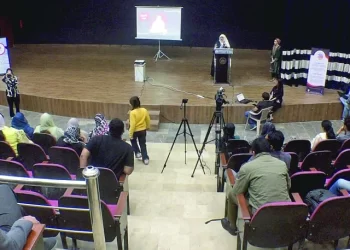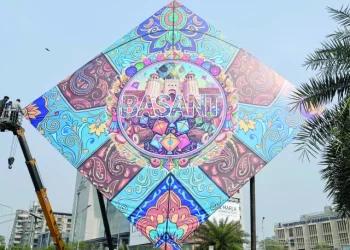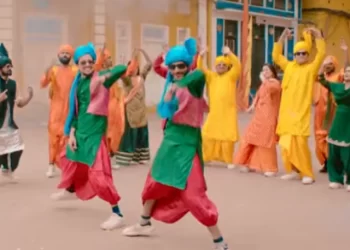Something about adapting a plague for the stage is elementally unlike a tale of star-crossed lovers, I remark to Meher Jaffri. She takes a moment to mull it over. Theatre proclaims a viscerality of its own. Tragedy or farce, the stage relies on the body as its fated mode of transmission. So what happens when a plague story takes the body itself as the crisis and brings it to the stage?
Meher’s upcoming play, The White Plague, is one way to explore this. The production is all set to return to Karachi’s Arts Council on August 21 after its premiere in November and debut in Lahore’s Al Hamra on September 4. Adapted from Czech playwright Karel Čapek’s penultimate work, this Urdu rendition is the last piece commissioned by the late Zia Mohyeddin.
Čapek’s play is also one of the many titles that found a new life after COVID-19 officially became the century’s pandemic. According to Guardian, Albert Camus’s novel The Plague saw its sales triple in 2020, mirroring a similar surge in Italy. Other names to enjoy renewed attention include Mary Shelley’s The Last Man (1826), José Saramago’s Blindness (1995), and Michael Crichton’s The Andromeda Strain (1969).
If the pandemic and the rise of pandemic fiction feel like a distant memory, it’s worth remembering that the WHO only ended the COVID-19 Public Health Emergency of International Concern (PHEIC) on May 5 of last year. To explore the implications of revisiting Čapek’s antiwar fiction in the present milieu, Meher speaks to The Express Tribune about the creative process and the story’s appeal to young audiences.
“We have some of the best actors and it is a satire. So you’re laughing your way through some hard hitting subjects,” she tells me over Zoom. We meet on a typical Karachi monsoon morning fraught with power outages. Even with a lot to lament about the city’s decrepit infrastructure and a constricting national space for artists, Meher is optimistic.
“I love using humour to access themes and topics that are relevant in today’s world. I mean, the world is a place where there’s a lot going on. There’s a lot for young people to take in,” she adds. “The culture of bringing people together to watch something gives young people the energy and the passion to deal with this world. We like to say that the youth is not involved, they’re so disengaged and in their own world but they actually really want to be a part of everything.”
Just like today
Set in an unnamed European nation on the verge of war, Čapek’s gripping drama unfolds as a mysterious plague strikes, sparing no one over the age of 45. The play follows a dedicated doctor who discovers a cure but imposes strict moral conditions for its use, challenging the government and society. As tensions rise, The White Plague explores themes of authority, morality and the human spirit in times of crisis.

Although written in 1937 against the backdrop of a looming World War and the rise of Nazi power, the Czech writer’s take on a pandemic might as well have been written today. “It is the most relevant story of this era,” says Kashif Hussain, one of the play’s lead actors, formerly seen in Qatil Haseenaon Ke Naam and Churails.
“You might start doubting that it was written in 1937 because of its premise and the global landscape in it.” With The White Plague being his third play after COVID-19, Kashif plays Dr Galen whom he describes as “a brave and empathetic” war veteran and medic. “His idea of humanity is simple: No man should be dealt with violence.”
Much of the play’s premise and ambition hits home. COVID-19 serves as the most recent vantage point for a Pakistani audience, despite the story’s European setting and characters. Unlike the global north and many regions from the global south, Pakistan was fortunate in its run-in with the pandemic. But how can one recast a global catastrophe when the local audience has only witnessed its favourable side?
The need to belong
For Meher, the plague is only one facet of the story. “I read this play when I was 16 years old and it always resonated with me. Even before the pandemic, it was always on my mind because the themes of moral courage and doing the right thing have always been relevant.”









